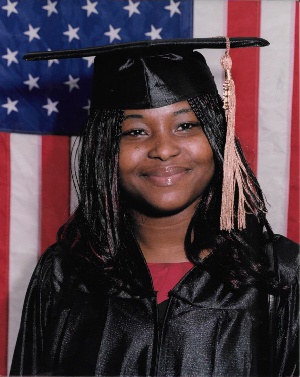I am not quite sure where to begin but let’s start here…
When you Google ‘Africans in America’ most of the content and images which pop up are images captured during the old days of slavery. Images that leave you wondering about modern day Africans in America and why our stories are not documented.
Well, how can we expect to have our stories documented when we believe the best solutions to resolving our problems and addressing our concerns are to:
Keep silent and hope that it disappears Mind our business and only deal with issues in our home Leave it in God’s hands Unfortunately, these are the mindset of many Africans today.
In 1991, my parents made the decision to take my brother, sisters, and I to America for a better education. That was the year we fell victim to brain drain. Prior to leaving Ghana, my father was a Senior Traffic Superintendent and a Regional Manager for the State Transport Corporation (STC), Ghana’s only long distance transportation company running length and breadth in the country and providing international services to Nigeria, Ivory Coast, and Burkina Faso.
As Regional Manager, he was based in Ivory Coast for quite some time and we would visit him every holiday and vacation. My mother made sure of it. Life was pretty good for us prior to leaving Africa. We had the best chauffeurs; dining experiences, enjoyed ice cream, and ice-skating on weekends at Hotel Ivoire in the city of Abidjan, Cote d’Ivoire. If life were so good why then would we leave African?
It was becoming increasingly popular to leave for the States in pursuit of better employment and educational opportunities. My father was among the few Ghanaians who were granted this rare opportunity, especially one that allowed him to travel with five children at once.
Our first stop was Davenport, Iowa located in the Midwestern United States where we lived for a little over one year. We attended the local elementary school, which happened to be a Catholic school. We are not Catholic but at the time there were not many options for schooling.
Naturally, it was tough adjusting to a new life abroad but having my sisters and brother around helped. In Iowa, my father who once held this prestigious position for one of the leading transport companies in Africa was now working at the local diner as a dishwasher alongside my mother and eldest sister. To cut the long story short, we endured in Iowa but we were together as a family and did what had to be done.
My father left Davenport and relocated to Brooklyn, New York after he was hired as a Customer Service Associate by Greyhound Bus Lines in Manhattan and was promoted to Customer Service Supervisor six years later. Shortly after his move, my mother, my sisters, and I joined him. My brother had been sent off to the Army and my eldest sister left for upstate New York where she would attend university.
We spent about 2-3 years in Brooklyn then set off to the Bronx where we have spent majority of our time since moving to America. I attended junior high school and high school in the Bronx, graduated, and left for college at a small quaint town about an hour and a half outside of New York City.
We experienced racism along the way but I didn’t quite acknowledge it until I attended college. I guess because I was much older then and had become more privy to the history of African-Americans and Black people in America.
In college, I was given the name ‘Tommy’ after pledging one letter and helping a male friend pledge for Alpha Phi Alpha Fraternity, Incorporated (Sigma Eta Chapter). The name was derived from the hit show ‘Martin’ featuring actor Martin Lawrence.
Tommy was a friend of Martin’s who claimed to have a job but nobody knew exactly what he did. In college, there were times where I had two or three jobs in addition to being a full-time student. I’ve always enjoyed working!
The first time I remember vividly experiencing an incident of racism was while working at an off-campus location. A friend of mine was leaving her job and recommended me as her successor. She was happy to recommend me and gushed about how lovely she had been treated at the place. They would take her out to lunch, buy her gifts, give her bonuses; she even got to work upstairs at the front/main office. It sounded like the dream job for any college student.
I was excited and could not wait to start! Once I started, I did not receive the same warm reception that she had received. As a matter of fact, I didn’t get the option of working upstairs. Instead, I was placed in the dusty, dark, and cold basement with no heat and tasked with moving files and folders from boxes to a shelf as tall as the ones you see in national libraries.
I didn’t complain though because after all, I had a job, which my friend had recommended. That had to count for something. I was grateful! The saddest part was that I felt after I had completed the shelf assignment, I would do such a great job that they would have me sit upstairs.
Well, I finished the job in the basement and was told that I was no longer needed and was let go. I never shared this story with my friend because I didn’t believe she would understand. How could I expect her to understand when I didn’t fully understand what had happened? I brushed it under the rug and moved on to the next.
The second time I experienced an incident of racism was quite interesting. It was not directed at me but I was just as guilty because I never spoke up about it. I recommended a friend for a work-study job on campus. It was the same department I happened to work. There were times when she and I would be on the same shift and times where we worked separately.
I recall a time where I was working in the office alone and was approached by the head of the department. He stated to me, “Wow! You really work hard. You have good work ethic. You are not like them.” Hmmm, not like them? Some part of me felt good because I was being given a compliment but another part of me was confused. Who was ‘them’? Being my naive self, it didn’t dawn on me that he was referring to African-Americans.
My friend happened to be African-American. Is this how we were distinguished? I thought we were all Africans? I thought we were the same? Were we not the same? That comment really opened my eyes to the fact that some white American’s do not consider African-Americans African nor did they have any respect for them.
In some sick twisted way, I still took it as a compliment and continued to do the best that I could. I could not disappoint because I was the exception and so I continued to work with the department for at least three semesters.
After college, I moved a few times. I lived in Baltimore, Maryland, Syracuse, New York, and Decatur, Atlanta where I continued to work short-term and temporary jobs until I returned to New York City in 2004. I returned in a very bad state and stayed with my parents. They loved me back to life!
In September 2004, I landed my first real corporate position as an Assistant to the Human Resource Director of the largest private owned condominiums in the U.S. Finally, life seemed to be on the right track. Like my father, I also worked as an assistant for a little over seven years and was promoted in 2011.
With the company under new management, changes were taking place and one of those changes was my promotion to Director of Human Resources, becoming the first black female to hold a director’s position. Things seemed to be going very well until I made one mistake in my eight years of working there and was asked to resign with no infractions in my personnel file.
Prior to this incident, I had already been toying with the idea of relocating to Ghana but I didn’t have the courage to quit my job. Not because I was afraid, but because I didn’t want to leave with no income coming in. I had a mortgage and other expenses.
On April 20th, 2012 at approximately 12:00 noon, I ended ties with a company I dedicated 8+ years of my life to and walked away with a severance. I probably could’ve put up a fight but I didn’t bother. After all, I knew I was not returning to corporate America.
What I should probably explain is that this is a company run by predominantly Italians and as the ‘Black Girl’ who was ‘given’ this rare opportunity I was not grateful enough. I was not the ‘yes’ girl and instead of having managements back 100%, whether they were right or wrong, I was for the people. How silly is it that a Human Resource person is for the people.
Not to mention, for the one year and few months I held the role of Director, I did not have any assistance although I requested for help several time. Instead, I worked single-handedly managing a department for a 121-acre property with over 45,000 residents, owners, and commercial tenants combined. At most, managing a staff of 350, 8 unions and trades as well as non-union employees.
I was expected to arrive early, leave late, attend collective bargaining meetings, union meetings, labor relations meetings, staff meetings, facilitate programs, discipline employee’s and managers, attend evening classes, and sit pretty. And for one year I did it. I did it proudly because I was the ‘Black Girl’ who had been given an opportunity, as though I did not earn it, and had to be grateful through my actions and work ethic.
A year or so later after I left, the man who decided to get rid of me was discharged for embezzlement and although I tried to bring it to the attention of the Board of Directors I was disregarded because I was the ‘Black Girl’ who was given an opportunity turned angry ‘Black Woman’.
Shortly before I ended my ties and walked away, my father had also been let go from his job after 17 years. The company was downsizing and they saw a need to lay off their senior employees. He barely made it for his pension after 17 years of not taking a vacation, leave, or calling out sick.
I have never quite shared any of these stories because of legal reasons but mainly because I did not think it mattered. I suppose I am a product of my cultural heritage. Instead of talking about it I kept silent and hoped that it will disappear. I decided to mind my business and leave it in God’s hands. Until Now!
Modern day Africans in America are made to feel special but in a deceptive kind of way. It is similar to the case of the ‘House Negro’ vs. the ‘Field Negro’ the great Malcolm X spoke about after the March on Washington in 1963. We are made to feel as though we are the exception; exempt from the rules when in actuality we are not.
To be continued…
Opinions of Monday, 11 July 2016
Columnist: Rita Kusi,threesixtygh.com



















